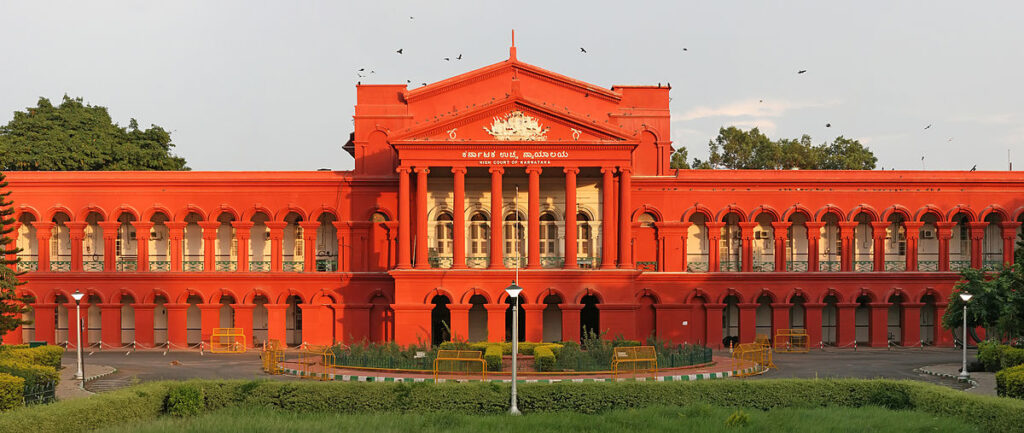
On June 18, 2024, the Karnataka High Court granted bail to a 23-year-old man accused of rape, allowing him to marry the victim. Both families favour the marriage, and the girl has recently turned 18.
The accused, hailing from Mysuru, was arrested in February 2023 following allegations by the victim’s mother. She claimed that he had repeatedly sexually abused her daughter when she was 16 years and nine months old.
The girl later became pregnant, and DNA tests confirmed that the accused was the biological father of the baby. The high court has granted the accused 15-day bail to marry the rape survivor within that period, as reported by the Hindustan Times.
Justice M Nagaprasanna issued the interim order last Saturday in response to a petition from the accused, seeking to dismiss the charges since both families want to proceed with the wedding. The court also stated that the decision aims to protect the child’s interests and support the young mother.
The accused is charged under Section 376(2)(n) of the IPC and Sections 5(L), 5(j)(ii), and 6 of the POCSO Act, 2012. Given the circumstances, Justice Nagaprasanna noted the necessity of the marriage to support the young mother and child, given their vulnerable situation.
In another case, village elders and the parents of a 14-year-old rape survivor in Bareilly, Uttar Pradesh, arranged for the girl to marry the man who allegedly raped and impregnated her in 2017.
According to media reports, the girl’s parents are daily wage workers and could not afford to take care of her and her child. Their requests for financial assistance from the local administration were disregarded.

Resolution of Rape Cases through Marriage
There are various situations in which rape survivors end up marrying the men who raped them, as per Geeta Ramaseshan, a senior lawyer from the Madras High Court.
Firstly, in some cases, a couple is in a consensual relationship. Still, due to differences in caste or parental disapproval, the man is accused of rape, especially when the girl is a minor.
During the trial, the man may agree to marry the girl, and there may have been consensual sex with a promise of marriage. The girl may also express her desire for marriage.
Another scenario involves rape cases where the perpetrators convince the survivors to have sex by falsely promising to marry them, a promise they do not fulfil.
According to the National Crime Records Bureau (NCRB), there were 12,568 reported rape cases in 2018 related to known persons promising to marry the victim. In 2017, there were 10,553 such cases.
In 2013, data journalist Rukmini Shrinivasan studied 460 cases under trial in New Delhi’s district courts. Of these, 109 cases were filed under ‘false promise to marry,’ with only 12 resulting in conviction.
Furthermore, Shrinivasan’s study found that more than a third of rape cases involved consensual sex outside of marriage, often filed by parents of minor daughters.
Ravi Kant, president of the NGO Shakti Vahini, noted that while police may be reluctant to file a First Information Report (FIR) in such cases, they are now compelled to register the cases due to stringent Supreme Court guidelines and legislation.
In some instances, the accused may spend a few months in jail before reaching a settlement with the survivor, leading to a withdrawal of her statement in court. Many of these cases end in a monetary settlement or marriage.
However, there is a third category of rape cases where pressure to marry the rapist is both insidious and beyond the purview of the law.
Judges sometimes feel that marriage is the best solution in rape cases, particularly those resulting in unwanted pregnancies. “What will happen to the woman? Who will take care of her?” said Ramaseshan.
“These stigmas are strengthened if a child is born due to rape. When the man offers or agrees to marry her because the judge has asked, it is only to escape the punishment.”
However, Geeta Ramaseshan emphasised that “rape is not an offence that can be settled,” and such offers from courts are not sustainable.
Additionally, the practice of pressuring rape survivors to marry the rapist may become a norm if adopted in one case, as stated by Suman Chakravarti, the public prosecutor in the Vadakkumchery rape case.
The “marry-your-rapist-to-get-out-of-jail-free” tactic is not recognised under any law. Still, it continues formally within courts and informally within families and village councils.
Marriage is often used as a ploy for convicted or accused rapists to evade punishment, something that a court of law cannot be part of, according to Chakravarti.
Marriage as a Solution to ‘Lost Honor’
In a false-promise-to-marry rape case under trial in a Delhi court, a 23-year-old woman (then 19) accused a man of raping her on the pretext of marrying her in 2017.
According to Article 14, the woman immediately called the women’s helpline and the Delhi Commission for Women (DCW) helpline to file a complaint against the accused.
“When I went to the police station to register a complaint against him, he told the police officials that he would marry me in two years,” she said.
“He started to cry in front of the Assistant Commissioner of Police (ACP). She then asked me what I wanted. I told her that I wanted justice. She then told me that I must marry him to live respectfully in society. So, I agreed and didn’t file the complaint,” she said.
“I was firm then and willing to fight the case, but he and his family forced me. They threatened to beat my parents if I didn’t agree to marry him.”
In June 2019, they finally got married. However, just two months into the marriage, the man left the woman, confessing that he had only married her to evade facing rape charges. The woman is currently fighting a case under section 498A of the Indian Penal Code, which pertains to cruelty by the husband or his family members.
“Only I know how I live with this stain on mine and my family’s honour,” said the survivor.
“All my relatives and neighbours know that I was raped by my husband. I am only living for my parents, who support me fully. Otherwise, I have no motivation to live when I know that I have to fight every day to get justice.”
Village Panchayats often Pressure Victims of Rape into Marrying their Rapists
“Village elders and the relatives of the rape survivor are pressuring her to marry her perpetrator,” said Ravi Kant.
“This is inhuman and unacceptable. The government should raise awareness about this issue because such situations often occur at the grassroots level, and these cases often get settled without legal intervention.”
He also said, “The government should enact legislation to make such marriages illegal.”
Patriarchal societies stigmatise rape to the extent that a woman loses her ‘honour’ and purpose of life if she is raped. Even the courts are not immune to the idea of the ‘fallen’ rape survivor and fall into stereotypes of the ‘hapless rape victim’ when passing judgments.
Lawyer Seema Sammridhi said, “It becomes a matter of shame for the woman when the neighbourhood and her relatives find out she has been raped.”
“In our society, people continue to have such regressive thoughts that a woman who has been raped is ‘impure’. Such backward ideas leave women with no choice but to accept her rapist as her husband,” she said.
In rural areas, the stigma of rape can have a devastating impact on the survivor’s life. Members of the panchayat often diminish the seriousness of the crime, describing it as a mere “mistake” made by the perpetrator. Consequently, they believe the man must marry the survivor as a form of “punishment”.
Mariam Dhwale, general secretary at the All India Democratic Women’s Association (AIDWA), pointed out that there is a lack of government assistance in rehabilitating rape survivors, which hinders their ability to regain agency over themselves.
“It doesn’t matter if the survivor marries her rapist because her life gets distorted anyway. What’s the guarantee of security in such a case when the survivor is forced to marry a criminal? Does the court have any mechanism to check whether the survivor is leading a good life?”
Rape crimes and false-promise-to-marry cases often lead to marriages between the rape survivor and her rapist to avoid punishment. A similar phenomenon is also seen in acid attack cases.
In 2018, the Bombay High Court freed an acid attacker who was sentenced to life imprisonment after he married the woman he threw acid on. The attacker had spent eight years in jail before being set free by the court.
Safeguarding the Rights of the Survivor
Ramaseshan stated that the “advice” from police and courts to rape survivors to marry their rapists must be documented and recorded in court.
“The judge will have to ask her whether the settlement is of her own will. I have seen judges ask this of the survivor in their chambers with no one else present. Women in a few instances have told the court that they are not willing but are being compelled by their families,” she said.
Another potential solution is to increase training sessions on gender, patriarchy, and caste tensions. “Many judges and police are aware of these issues but ignore them. During one training for police inspectors, when I raised this issue, I was told that if such marriages did not take place, there would be caste riots in the area. These tensions and complexities must be addressed,” said Ramaseshan.
Oversight is perhaps the most critical aspect of protecting rape survivors. “Human rights lawyers and NGOs working on women’s rights must follow up the case at all stages to ensure that there is no injustice,” added Ramaseshan.
Amending rape laws to ban settlements in rape cases is not a viable option, according to Chakravarti. He stated, “The survivor is always free to marry anyone, including the accused. It depends on the facts and circumstances of each case. However, such marriage cannot be used against the prosecution.”
Chakravarti further explained, “The prosecution for rape is for the offence committed, which the accused will have to face at any rate. By contracting into a marriage with the survivor, one should not assume he can escape for good.” In some cases, such as the Odisha rape case, bail was granted conditional to the marriage between the survivor and the accused rapist.
India may have strict rape laws and the POCSO Act, which may prescribe death as punishment for rape. Still, the conviction rate is 27.2%, according to the 2018 NCRB report mentioned earlier, because of such settlements and compromises.





